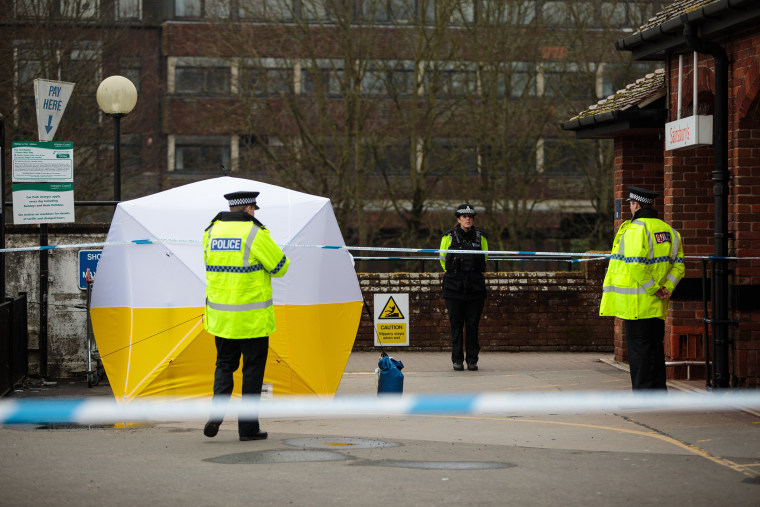LONDON — Boycotting soccer's World Cup, seizing oligarchs' mansions and even invoking NATO's collective defense clause: British Prime Minister Theresa May has a range of options to retaliate against Russia for the poisoning of an ex-spy on U.K. soil.
On Monday, May said it was "highly likely" that the government of Russian President Vladimir Putin was responsible for the poisoning Sergei Skripal, a former Russian double agent who passed secrets to the U.K., and his daughter, Yulia.
May then gave Russia until midnight Tuesday to explain why a Soviet-developed nerve agent was used in Britain.
"Should there be no credible response, we will conclude that this action amounts to an unlawful use of force by the Russian state against the United Kingdom," she said, promising "much more extensive measures" than the U.K. has previously taken against the Kremlin.
Britain's Press Association reported after the deadline passed with no reply that May would meet with senior intelligence officials and ministers later in the morning "to discuss developments in the case." May is also likely to make another statement in the House of Commons, Press Association reported.
A spokesman for Russia's embassy in London told Reuters: "Russia will not respond to London's ultimatum until it receives samples of the chemical substance." The spokesman again denied Russian government involvement and said, without elaborating, that Moscow would respond to any British measures.
The British Foreign Office had no comment, Reuters reported.
So what are May's options — and how could they affect Britain's closest ally, the United States?
Collective defense
Perhaps the most drastic possibility is that May might invoke NATO's mutual defense clause, Article 5. The first and only time this has been used was by President George W. Bush after the 9/11 attacks on the United States.
Article 5 says that an attack against one NATO member "shall be considered an attack against them all." Invoking it would not necessarily mean military retaliation — its wording leaves that open to interpretation — but it would certainly be a bold step.
"Britain should now apply current financial regulations robustly and effectively"
"It's not as if Article 5 would plunge the world into a war between Russia and NATO," said Mark Galeotti, a senior researcher at the Institute of International Relations in Prague.
NATO Secretary-General Jens Stoltenberg called the use of any nerve agent "horrendous and completely unacceptable."
Meanwhile, the British government has played down the possibility of invoking Article 5, according to the BBC, and then there's the question of how President Donald Trump would react to such a call for Western solidarity.
Trump has sent jitters throughout Europe with mixed messages about his feelings on NATO and repeatedly calling out allies for not meeting their spending targets.
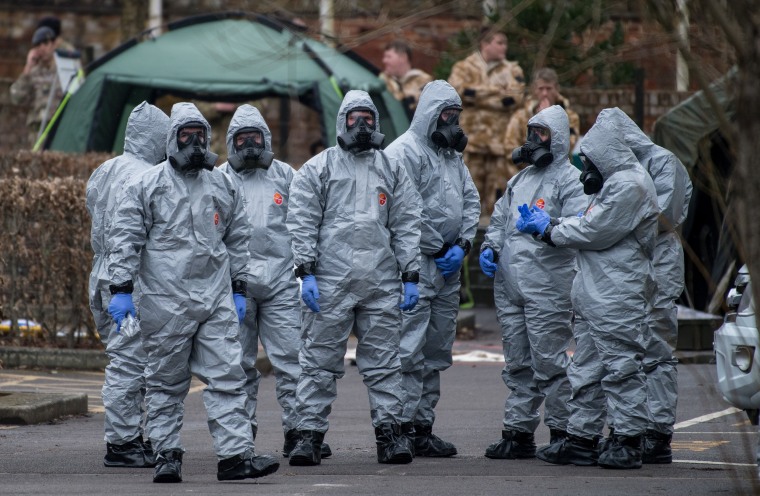
Before he was replaced as U.S. secretary of state early Tuesday, Rex Tillerson called Skripal's poisoning "a really egregious act" that "clearly came from Russia."
But the White House response has been more muted, with spokeswoman Sarah Huckabee Sanders stopping short of blaming the Russian government and Trump failing to tweet about it at all.
"Britain could invoke Article 5 of the NATO charter, saying that they were attacked and that all NATO nations would have to come to come to its aid in this instance," MSNBC terrorism analyst Malcolm Nance told "The Last Word" with Lawrence O'Donnell on Monday. "I don't believe this White House would honor that."
Money and media matters
London has long been a favorite destination for wealthy Russian oligarchs to park their money, buying up luxury property and other assets. Even before the Skripal case, there was a rising chorus of protest against this sea of shadowy cash washing up on Britain's shores.
"It's time to get tough on the Kremlin kleptocrats using London as a playground for money laundering and cover for Putin’s cyber and propaganda attacks on the West," Conservative lawmaker George Freeman told Parliament on Monday.
One way the U.K. government could do this is by using Unexplained Wealth Orders. Implemented in January, UWOs allow British authorities to seize property and other assets that individuals suspected of crimes can't account for.
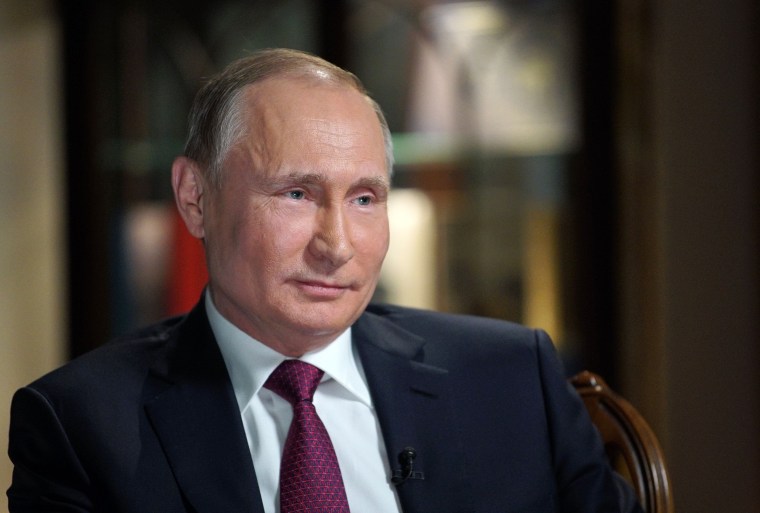
Chatham House, a think tank based in London, illustrated current gaps in the sanctions regime currently slapped on Russia by highlighting the case of Oleg Deripaska, a Putin confidant who was able to repay loans on a sanctioned Russian bank by listing shares in the British capital.
"Britain should now apply current financial regulations robustly and effectively," the think tank wrote Monday.
The ties between Russia's billionaires and the British capital run so deep that London has been nicknamed "Londongrad" and "Moscow-on-Thames."
In 2015, a report from Deutsche Bank found that Britain was attracting about £1.5 billion in unrecorded capital every month (about $2.1 billion) — and a "good chunk" of that was from Russia.
The problem with this strategy, according to Galeotti at the Institute of International Relations, is that these oligarchs could just move their money to other European cities.
"We really need to be thinking how to respond to this collectively," he said. "If London is going to be closed to Russian money, then Frankfurt and Paris need to be, too."
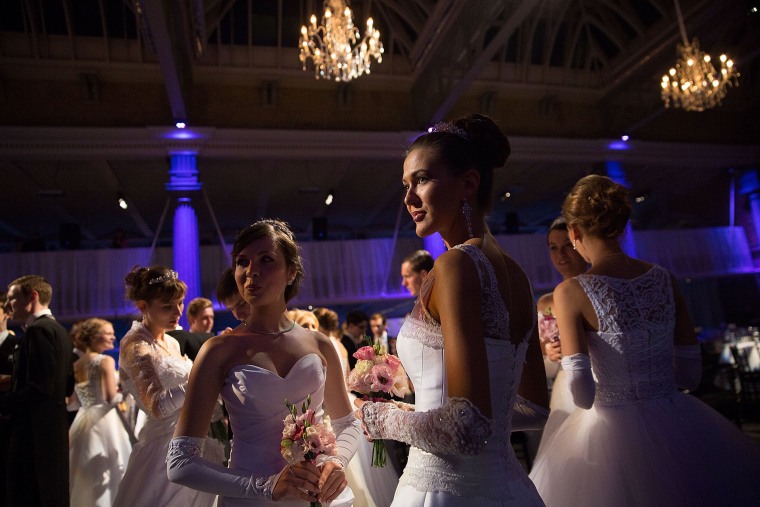
This call for European cooperation comes as the U.K. goes through the complicated process of leaving the European Union after the 2016 Brexit referendum.
Nevertheless, Valdis Dombrovskis, a vice president at the European Commission, said, "Of course the U.K. can count on E.U. solidarity in this regard."
Some have also called for blocking the Russian TV stations RT and Sputnik, which critics say are a propaganda wings of the Kremlin, from British airwaves. Others have suggested that Britain may be preparing other retaliatory measures against Russia.
U.K. Home Secretary Amber Rudd hinted at a covert response last week: "You may not hear about it all, but when we do see that there is action to be taken, we will take it."
Diplomatic maneuvers
Another more likely route is an increase in sanctions on Russia and the expulsion of intelligence and diplomatic staff from Britain.
Sources told Robert Peston, political editor with ITV News, NBC News' U.K. partner, that "a number, but not all Russian government staff based at its embassy in London, will be expelled." Russian Ambassador Alexander Yakovenko will most likely not be among those asked to leave, he reported.
Many analysts say Britain would be reluctant to completely break off its useful diplomatic conduit to Moscow.
Similar measures were taken after the killing of Alexander Litvinenko, an ex-spy and Putin critic whose 2006 murder in London was "probably" sanctioned by the Russian president himself, a British judge ruled last year.
Some British lawmakers are also campaigning for legislation that mirrors the Magnitsky Act, a U.S. law passed in 2012 that froze assets of Russian investigators and prosecutors suspected of human rights abuses.
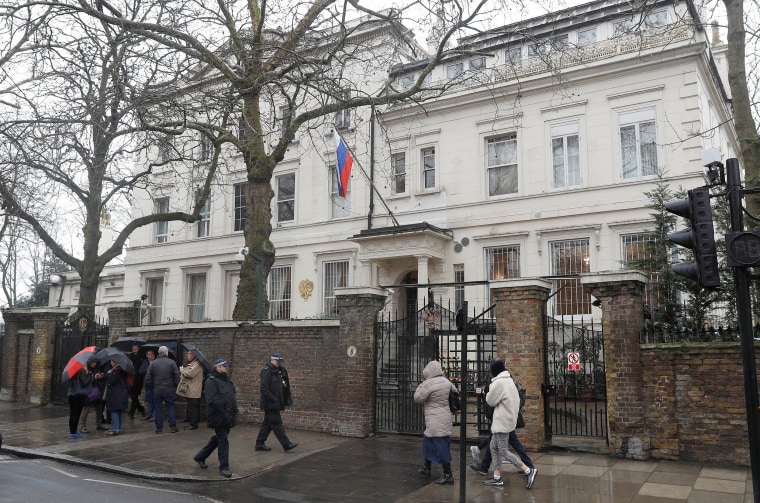
A British "Magnitsky amendment" — named after the Moscow lawyer Sergei Magnitsky, who was killed in Russian custody in 2009 — could be included in a bill currently passing through the U.K. Parliament.
Perhaps in anticipation of these measures, Britain's envoy to Moscow was summoned to the Russian Foreign Ministry on Tuesday, according to the country's state-run TASS news agency.
Meanwhile, Russia's Foreign Minister Sergey Lavrov said his country would only cooperate with the investigation if it receives samples of the nerve agent at the center of the case.
Moscow's requests to see samples of the nerve agent have been turned down, which Lavrov called a violation of the Chemical Weapons Convention.
He went on to insist that Russia is "not to blame" for the poisoning.
World Cup boycott
Several lawmakers have even raised the prospect of boycotting the soccer World Cup, which is being held in Russia this summer.
The Daily Mail newspaper asked on its Tuesday front page: "How can we go to Putin's World Cup now?"
This would send shockwaves through soccer-crazy England and would be the first time its national team did not journey to the tournament since failing to qualify for the U.S.-hosted competition in 1994.
The Russian foreign ministry has seized on soccer as being the motive behind Britain's laying the blame at its door.
"The British," it said in a statement, are "unable to forgive Russia for winning the right to host the 2018 FIFA World Cup in a fair fight."
However, some feel that this move would gain little traction beyond generating some outraged headlines.
"This is merely symbolic, domestically unpopular and unlikely to be emulated by others," according to Chatham House. "At most, it would be a temporary embarrassment for Russia with no lasting effects."
The think tank backed a boycott by senior ministers and royalty, but concluded that "there is little gain, and no long-term cost, in not sending the England team."
